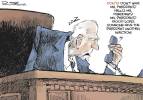Legislature pushes toward progress
Welcome to New Nevada.
Some Nevada conventions died Thursday, when the state Assembly followed the Senate in passing a pair of resolutions that would undo a couple of long-standing Nevada traditions.
The first: institutionalized discrimination against gay and lesbian couples when it comes to marriage.
The second: the coddling of the mining industry with a special, industry-specific tax cap that’s been in the state constitution since that document was approved by President Abraham Lincoln in 1864.
Maybe there’s hope for the Silver State after all.
When it comes to gay marriage, most people believe the 2000 and 2002 ballot initiative known as Question 2 was the instrument that banned gays and lesbians from marrying people of the same gender. But legal discrimination goes back further than that, all the way to Nevada Revised Statutes 122.020, which says marriage in Nevada is limited to a man and a woman, older than 18, not nearer than second cousins.
That’s important, because the original version of Senate Joint Resolution 13 simply would have repealed the part of the Nevada Constitution that was altered by Question 2 in 2002 to double down on the no-gay-marriage thing. Even if voters had approved it, gays still would have been denied the right to marry.
That’s why lawmakers, led by Sen. Tick Segerblom, D-Las Vegas, amended it to not only repeal the ban on gay marriage in the constitution and the law books, but to specifically allow gay marriage. That amendment cost some Republican support, but the measure passed anyway, 12-9 in the Senate and 27-14 in the Assembly on Thursday.
There’s still a long way to go, however. The resolution will be delivered to the secretary of state, who will return it to the Legislature in 2015 for a second round of voting. Assuming it gets a majority vote in both houses two years from now, voters will have a crack at approving it on the November 2016 ballot.
The odds are the U.S. Supreme Court will settle the issue long before then, either in a ruling on a pair of related cases currently pending, or in a ruling directly challenging Nevada’s constitutional marriage ban that’s waiting at the 9th U.S. Circuit Court of Appeals.
But the votes on the resolution were important signposts on Nevada’s road trip to progress.
Meanwhile, voters will get a crack at the mining tax cap much sooner — it will be on the November 2014 ballot. If approved, lawmakers could write a new mining tax law as early as the 2015 session, although legislative lawyers say existing mining taxes will remain in effect. (The timeline may be thrown off somewhat by an expected mining industry lawsuit.)
One of the more remarkable things about the resolution was the fact that it was picked up by a Republican, Sen. Michael Roberson of Henderson. It’s remarkable because during the 2011 session — when the resolution underwent its first round of voting — it was championed by then-Sen. Sheila Leslie, D-Reno, one of the Legislature’s more liberal members. To hear Roberson uttering some of Leslie’s old lines was jarring, to say the least, especially to mining lobbyists who’d helped defeat Leslie in 2012. (Her replacement, state Sen. Greg Brower, was one of six Senate Republicans to vote in favor of the resolution, too. Oh, the irony.)
Opponents predicted social and economic calamity would ensue should either measure pass, but that’s not going to happen. (On the other hand, the promise of state revenue from mining and gay weddings may be somewhat overblown, too.) The bottom line is, Nevada is changing, and for the better. And sometimes change requires abandoning old traditions.
Steve Sebelius is a Review-Journal political columnist and author of the blog SlashPolitics.com. Follow him on Twitter (@SteveSebelius) or reach him at (702) 387-5276 or ssebelius@reviewjournal.com.























